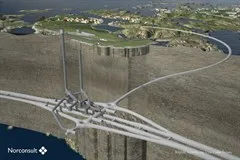Four groups that made bids for building the southern section of the Warsaw Ring Road have filed complaints about how the national road authority GDDKiA chose Astaldi as the winner.
Companies appealing to the National Board of Appeal (KIO) are Impresa Pizzarotti, Porr Polska, Salini Polska and IDS-BUD.
The offer made by Italian company Astaldi was at least 25% less than the estimated €391 million cost of the project, according to Polish media reports.
World Highways reported in February that Astaldi
June 18, 2015
Read time: 2 mins
Four groups that made bids for building the southern section of the Warsaw Ring Road have filed complaints about how the national road authority 1361 GDDKiA chose 1324 Astaldi as the winner.
Companies appealing to the National Board of Appeal (KIO) are Impresa Pizzarotti,3976 Porr Polska, Salini Polska and IDS-BUD.
The offer made by Italian company Astaldi was at least 25% less than the estimated €391 million cost of the project, according to Polish media reports.
World Highways reported in February that Astaldi’s €290 million bid was the lowest offer for the project. The work calls for a 4.6km section of the route to be constructed, including what will be Poland’s longest road tunnel once complete.
The dispute comes just as an engineering and construction group led by Astaldi signed the largest construction financing package in Turkey’s history – US$5 billion - to refinance existing loans and provide new funding for a $6.4 billion toll road.
Astaldi and its Turkish partners3338 Nurol Insaat, 3340 Makyol Insaat and Ozaltin Insaat agreed to the loan from nine lenders, including 3321 Deutsche Bank for the 400km road and suspension bridge across the Sea of Marmara. Financial news agency Bloomberg said the loan is the largest for a project in Turkey.
Astaldi said in a written statement that the new financial package will allow completion of the final portion of the 301km route linking the city of Bursa to the Aegean port of İzmir (Phase 2B) and to refinance the sections under construction for the Gebze-Orhangazi-Bursa link (Phase 1 and Phase 2A).
Companies appealing to the National Board of Appeal (KIO) are Impresa Pizzarotti,
The offer made by Italian company Astaldi was at least 25% less than the estimated €391 million cost of the project, according to Polish media reports.
World Highways reported in February that Astaldi’s €290 million bid was the lowest offer for the project. The work calls for a 4.6km section of the route to be constructed, including what will be Poland’s longest road tunnel once complete.
The dispute comes just as an engineering and construction group led by Astaldi signed the largest construction financing package in Turkey’s history – US$5 billion - to refinance existing loans and provide new funding for a $6.4 billion toll road.
Astaldi and its Turkish partners
Astaldi said in a written statement that the new financial package will allow completion of the final portion of the 301km route linking the city of Bursa to the Aegean port of İzmir (Phase 2B) and to refinance the sections under construction for the Gebze-Orhangazi-Bursa link (Phase 1 and Phase 2A).






